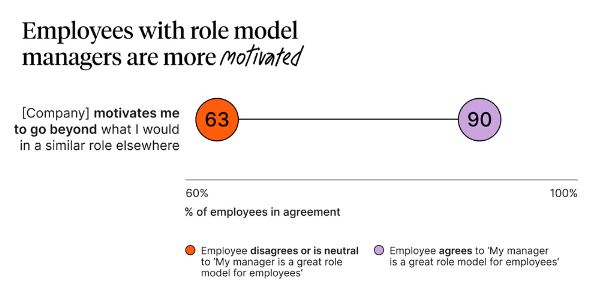
If you want your business to succeed, and your employees to perform at their best, you’ve got to have strong leadership skills.
Skilled leaders at all levels can help set the tone for a positive company culture, inspire your employees to be as productive as possible, and help guide you through challenges and opportunities alike.
On the other hand, those whose leadership skills are lacking can ruin everything by fostering a toxic work culture, eroding morale, and producing apathetic employees who want to do as little as possible and are looking for a reason to leave.
Truth be told, being a leader isn’t just about company culture, productivity, and the like.
If you want your business to succeed, it’s more about creating an environment where employees feel valued, motivated, and empowered to contribute.
In any case, numerous studies have shown a direct link between strong leadership skills and key business outcomes like employee engagement, productivity, and retention.
For example, as you can see from the graph below, according to a Culture Amp report, which surveyed more than a quarter of a million managers from over 3,300 companies, employees who feel that their manager is a great role model are 27% more motivated.

What’s more, these employees have much greater confidence in the companies they work for and are significantly less likely to quit within 12 months.
So, clearly, strong leadership skills are key to the success of your business, not least because they help to inspire more productive, loyal, and engaged employees.
But how can these kinds of skills help you to achieve these outcomes?
And what kinds of leadership skills should you and your team be focusing on?
With these questions in mind, if you’re having issues with your leadership team, or you’re looking to become a better leader yourself, then keep reading to learn how strong leadership skills can benefit your business and your employees.
What Leadership Skills Should I Focus On?

If you own a business, developing your leadership skills is one of the best things you can do.
But when it comes to improving employee performance, and boosting the overall success of your business, there are certain skills that are more important than others, including:
Emotional Intelligence
No matter how you slice it, emotional intelligence is always at the heart of strong leadership.
This skill allows leaders to recognize and manage their emotions, as well as understand and influence the emotions of others.
Leaders with high emotional intelligence are skilled at building relationships, resolving conflicts, and creating a positive work environment.
What’s more, they’re better at empathizing with employees, which helps to foster trust and loyalty.
For instance, an emotionally intelligent leader will notice when a team member is struggling and will proactively offer support, which helps to improve employee satisfaction and ensures issues are addressed before they escalate.
Communication Skills
Clear and effective communication is a non-negotiable skill for leaders.
Whether it’s setting expectations, giving constructive feedback, or rallying your team around a shared goal, leaders must communicate in a way that resonates.
That being said, strong communication involves not just speaking but also listening, as employees are more likely to feel engaged when they know their voices are heard.
Great leaders take the time to actively listen to employees’ concerns, ideas, and feedback, and this two-way communication builds a culture of mutual respect and collaboration.
Moreover, effective leaders will work to facilitate open discussion, encouraging team members to share their thoughts on whatever projects they’re working on, which helps to ensure all employees feel valued and have a sense of purpose.
Vision and Strategic Thinking
Employees look to leaders like you for both guidance and direction.
With that in mind, if you have a concrete vision that you can clearly articulate to your team, then they’re going to be more inspired to work toward your business goals.
Strategic thinking also allows you to anticipate challenges, identify opportunities, and develop plans that can help you achieve long-term success.
At the same time, a strong vision helps employees understand the “why” behind their work, providing context and meaning, which is critical for keeping your employees engaged and motivated.
Adaptability and Resilience
As we’ve learned firsthand over the last few years, today’s leaders must be adaptable and resilient to constant change.
Whether it’s evolving market trends, economic disruptions, or internal challenges, being adaptable allows you to pivot, when necessary, while resilience can help you remain composed under pressure and model a positive attitude for your team.
During the pandemic, for example, leaders who adapted quickly to remote work and supported their teams through all the uncertainty demonstrated exceptional leadership.
They communicated transparently about changes, adjusted workflows to accommodate new realities, and maintained a focus on team well-being.
Empowerment and Delegation
Great leaders know that they don’t have to do everything themselves.
In fact, trying to control every aspect of a project or team can lead to micromanagement, which can annoy your employees, breed resentment, and hinder their productivity.
Instead, effective leaders empower their employees by delegating tasks, trusting their abilities, and providing the resources they need to succeed.
Empowerment also involves encouraging employees to take ownership of their work and make decisions within their areas of expertise, which not only lightens your workload, but also boosts the confidence of your employees.
Conflict Resolution
Conflict is inevitable in any workplace, but how a leader handles it can make all the difference.
Someone with strong leadership skills will address disagreements promptly and fairly, ensuring that all parties feel heard and understood.
Effective leaders also have to remain impartial, focus on solutions rather than blaming others, and foster an environment where constructive dialogue is encouraged.
Believe it or not, a leader skilled in conflict resolution can turn a disagreement into an opportunity for growth.
For instance, if two employees have differing opinions on a project, a great leader will mediate the discussion, helping them find common ground and create a stronger solution.
Accountability and Integrity
Leaders must lead by example and show accountability, which means taking responsibility for your actions and decisions.
At the same time, integrity involves being honest, ethical, and consistent in your behavior.
In any case, a leader who admits their mistakes and works to correct them sets a powerful example for their team.
And if your employees see that you’re upholding these values, then they’re going to be much more likely to emulate them.
Collaboration and Team Building
Effective leaders know how to foster collaboration and build strong, cohesive teams.
This involves things like team-building activities, clear role definitions, and a focus on collective success, all of which help to create an inclusive environment where everyone feels like they belong and can contribute their unique strengths.
All things considered, a truly collaborative leader who knows how to build a solid team will recognize that diverse perspectives lead to better outcomes and will act accordingly.
How Can Strong Leadership Skills Help My Business Succeed?

Strong leadership skills tend to create a ripple effect, which can have a direct impact on whether or not your business succeeds.
They do this, in large part, by helping to create more engaged, motivated, and empowered employees, who are more productive, innovative, and loyal.
In addition, strong leadership skills also contribute to your success in business by offering:
- Stronger financial performance: Companies with effective leaders often experience higher profitability due to improved efficiency and reduced turnover costs.
- Improved customer satisfaction: Happy and engaged employees provide better customer experiences, which can lead to increased customer retention and loyalty.
- Greater adaptability: Organizations with strong leaders can pivot more effectively in response to market changes, helping to ensure long-term viability.
With that in mind, let’s take a closer look at how the leadership skills I discussed earlier translate into tangible benefits that can boost the success of your business.
Emotional Intelligence Improves Engagement
Emotional intelligence helps leaders build strong, trusting relationships with their team members.
And when employees feel that their leaders understand their emotions and care about their well-being, they are more likely to feel engaged, valued, and motivated.
In any case, creating this kind of relationship with your employees can help to inspire:
- Improved morale: Leaders who display empathy and emotional awareness create a positive work environment, which helps to improve morale by reducing stress and burnout.
- Higher engagement: Employees who feel emotionally supported by their leaders are more likely to be invested in their work, leading to higher productivity and engagement, and better overall performance.
This heightened employee engagement often translates into better business outcomes, including improved customer satisfaction and retention rates, as engaged employees are more likely to go above and beyond in their roles.
Communication Skills Create Clarity
Clear and effective communication ensures that employees understand their roles, responsibilities, and the goals they’re working toward.
Moreover, leaders with strong communication skills can improve business success by:
- Reducing misunderstandings: By articulating expectations clearly, leaders minimize confusion, which can help to ensure that tasks are completed accurately and on time.
- Fostering collaboration: Open communication creates a culture of transparency, where employees feel more comfortable sharing ideas and feedback.
And when employees are aligned with your organization’s vision and know what is expected of them, then they can perform their roles more effectively.
This clarity leads to fewer errors, faster decision-making, and smoother operations, which are all key components of business success.
Vision and Strategic Thinking Create Purpose
A leader with a clear vision inspires employees to see the bigger picture.
And when team members understand how their individual contributions fit into your business’ overarching goals, then they’re more likely to feel a sense of purpose and ownership.
At the same time, these kinds of leadership skills can help to improve:
- Motivation: Employees who know how their work contributes to meaningful outcomes are more motivated to deliver high-quality results.
- Alignment: A shared vision aligns the efforts of all employees, which helps you to stop wasting time and resources on misaligned priorities.
At any rate, if you provide the vision and strategic thinking to guide your team toward a unified goal, it will help to foster collaboration, give your employees a greater sense of purpose, and drive results that ultimately contribute to the growth and profitability of your business.
Adaptability Builds Resilience
Leaders who demonstrate adaptability inspire their teams to embrace change and navigate uncertainty with confidence.
Having said that, this skill is particularly important in today’s fast-paced business world, where unexpected challenges can arise at any moment.
And in addition to building resilience, adaptability offers many other benefits, including:
- Problem-solving: Adaptable leaders encourage employees to approach challenges creatively, resulting in more innovative and beneficial solutions.
- Reduced resistance to change: When leaders model flexibility, employees are more likely to adapt to new processes, technologies, or market demands without hesitation.
All things considered, an adaptable team is better equipped to maintain productivity and performance, which helps to ensure your business remains competitive no matter what happens.
Empowerment and Delegation Boost Autonomy
Empowering employees through delegation and trust not only takes some of the workload off of you, but also fosters a sense of autonomy and responsibility.
This empowerment drives employee performance, as team members take ownership of their work and strive to achieve better results through:
- Enhanced skills: Delegating meaningful tasks helps employees develop new competencies and confidence in their abilities.
- Increased motivation: Employees who feel trusted by their leaders are more motivated to excel in their roles.
And as employees grow into future leadership roles, this all translates into increased efficiency, innovation, and a stronger talent pipeline.
Conflict Resolution Promotes a Positive Work Culture
Leaders who handle conflicts effectively ensure that disagreements do not escalate into larger issues that can disrupt team dynamics and affect productivity.
And by making a point of addressing these kinds of conflicts promptly and fairly:
- Team cohesion improves: Resolved conflicts strengthen relationships and foster a culture of mutual respect.
- Focus remains on work: Employees spend less time dwelling on interpersonal issues and more time contributing to your business goals.
Moreover, a positive work culture rooted in respect and collaboration will help to enhance the satisfaction of your employees, reduce turnover, and improve productivity, all of which will benefit your business.
Accountability and Integrity Build Trust
Employees are more likely to take responsibility for their actions when they see their leaders doing the same, and they’re also more likely to trust them.
What’s more, when leaders model accountability and integrity, they set the standard, creating positive outcomes that include:
- Higher performance standards: Employees who see leaders demonstrating accountability are inspired to maintain high ethical and performance standards.
- Trust and loyalty: Integrity fosters trust, trust builds loyalty, and employees are more likely to remain committed to an organization whose leaders consistently act with honesty and fairness.
Furthermore, relationships between leaders and employees that are built on trust help to create a more stable and productive workplace, which can also help to boost business success.
Collaboration and Team Building Drive Results
Leaders who foster collaboration and build cohesive teams create a work environment where individuals feel supported and motivated to achieve collective goals.
And in addition to many other benefits, this kind of collaboration can lead to:
- Stronger problem-solving: Diverse perspectives within a team often result in more innovative and effective solutions.
- Higher productivity: Teams that work well together can complete tasks more efficiently and with fewer errors.
This kind of effective team-building leads to better business outcomes, including higher quality products and services, faster project completion, and increased customer satisfaction.
Looking to develop your leadership skills? Visit our leadership coaching page for more information or contact me today to find out how I can help.
Business Leadership, Team Management